- Home
- Sonya Hartnett
The Best Australian Stories 2012 Page 8
The Best Australian Stories 2012 Read online
Page 8
Across the bridge, it was the same, but in relief. ‘They hide there and will take you and use your blood to cook their special bread,’ said Karel T., who would later stand guard at a perimeter fence, but for now was also a teacher of young children. It was true. He had read a case in which there was incontrovertible proof that a young Christian child had been killed and her blood used for their dirty ritual. And what a great shame it was that his esteemed president, Thomas Masaryk, had besmirched his reputation defending these heathen murderers. Sure, thought Karel, it was fine to trade with them, and for the most part they kept to themselves, but it was still best to warn the children not to go near the bridge alone because no matter how nice they might seem at the market, you never really could trust a Jew.
Back in the village, the women gathered around the well to listen to the wet-nurse, Hanicka O., who would later die standing over a ditch, staring down at her shrivelled, empty breasts, embarrassed, counting the bodies of the children she remembered suckling, but for now was the source of all gossip. She was welcome in most homes and knew their secrets. ‘They say dybbuk, I know better.’
Hanicka had her own opinion on such matters. She had not forgotten a certain child brought into this world, a boy, who was not right and who, according to his parents, failed to come home one day. The travails of everyday life soon superseded the pity bestowed upon them by the village folk, but Hanicka did not forget. Nor did she fail to notice that at Tashlich, these parents would stand at the very end of the line, upstream from the bridge, and empty their pockets which, unlike the crumbs that fell from most other people, contained large chunks of bread and, if Hanicka was not mistaken, meat and sweets.
‘Let’s see what horror our people have caused this week,’ smirked Jakub R., the Rabbi’s son, who will die in a most peculiar way, in a far away land, but is now making mischief. He unravelled the paper and showed the article to his little brother Shmuel, of unknown fate, pointing at the smudged ink. It was unusual for boys on this side of the bridge to read the papers brought in on the back of Hermann F.’s cart. They were expected to devote their time to studying Torah in cheder or learning a trade, not wasting it with the frivolities of an irrelevant wider world. As Reb Shimon D., the blacksmith who would die covered in blood and shit in the back of a cattle train, often said, ‘A horse doesn’t shoe itself.’
However, young Jakub was different. Each fortnight, when Hermann’s cart would pass through the market, he would secretly buy a copy of the city newspaper with the few coins his mother had given him to buy bread and cheese for lunch because, he reasoned, an empty stomach might grumble but an empty head will most certainly scream. Then he would gather his brother and three friends and read it to them on the lower riverbank, by the bridge. ‘Knowledge is their dybbuk,’ he would often say.
Of the outsiders that regularly passed through the village, Hermann F. was both the best known, and the least liked.
Destined one day to swing from the gallows for treason, though it is not altogether clear against whom, he would arrive in the village each time from the northwest, walking alongside his poor donkey as it dragged an over-packed cart with one or the other wheel broken.
He would demand a drink from the first villager he encountered, as if he had walked all the way from B., or whichever city he was said to have come from that time. Amongst the villagers it was rumoured that he was rich, that his weary façade was simple chicanery, and that he offloaded surplus papers and trinkets from the trays of trucks that had driven to the forest to dump them and thereby amassed the seeds of his fortune. His books, often missing pages, or not matching the title printed on the cover, were always sold for a premium, as were his other assorted wares. He had grown accustomed to the wants of his customers, bringing for each what he knew he could sell and nothing more. Pity the donkey, who would be carrying a greater weight on departure, for coins weigh more than paper and tin, particularly when you demand so many for each worthless item.
Hermann F. appeared to hate these Jews, and would rush across the bridge as soon as he had offloaded his lesser wares. But he liked Jakub R. He particularly liked that the boy would always meet him on the other side of the bridge, away from the prying eyes of the village folk. Hermann would bring the latest newspaper for Jakub, always the one that cast the Jews in the worst light, perhaps trying to entice him to see the error of his people’s ways. And Jakub would invariably be thankful, in Hermann’s opinion too thankful, and never question the vast discrepancy between the price printed on the paper’s masthead and the one he was being charged.
In fact Jakub did notice all of these things, but was too afraid of losing his one connection to the outside world and was therefore willing to play Hermann’s nasty little games. He also knew that the paper he would buy each time could only have been popular amongst the rabble in town. But from it he discerned the odd bit of truth, and gained perspective on his place in the world. He also learnt that he had friends out there, friends in high places, like this man Masaryk, who had risked his career to help Jakub’s people.
‘That Jakub is trouble,’ whispered Old Chava, who would not live to see what was to come but instead die in the drowning-like discomfort of consumption.
‘Well of course he is,’ said Marta B. ‘He is friends with the dybbuk.’ She smiled crookedly, much as she would again when, but a few years later, she was packed into the back of a truck only to feel the air slip away to a symphony of crunching gravel and laboured sobs.
‘And to think, our poor Rabbi …’ Old Chava trailed off into a wet cough and then nodded thoughtfully. ‘With a son like that, studying in cheder to take his father’s position, what will become of our children?’ Old Chava was right.
She foresaw the disaster though it did not come to be in the way that she anticipated. When the children died in hails of bullets, or in gas chambers, or thrown directly into furnaces to burn alive, Jakub R. was nowhere to be found. For years before, on the night the Beth Din was to arrive so that he could sit his final Rabbinical examinations, Jakub packed his bags and fled the little shtetl along the road to the northwest, in the direction from which he would often see Hermann F.’s cart approaching.
And so it was that he left behind those ever-changing borders, the river, the bridge, the dybbuk, his family and the hundred or so condemned souls whose paths to their final fates were many but the destination a cold, dark one. All that remained of him was a note, scrawled in haste.
‘Dearest Maminku,’ it read. ‘I pray that one day I too shall be redeemed. If only in your eyes.’
Like the town itself, the note would also burn; a pyre to the lost and forgotten. Burnt crumbs cast from empty pockets. It was as if none of it had existed at all.
The Age
Scissors
Rebecca Harrison
We met the town’s first policeman in church. He had come to the Sunday morning service in the first week of his posting in Wren to ensure that we all knew he had arrived. Of course we did; the town was rife with gossip over it. We hadn’t had our own police officer or station before now and this was the source of all manner of speculation. Some were pleased – if a shearer took off with a fleece or a bit of equipment that didn’t belong to him, a station master wouldn’t have to go all the way into Yanco to report the matter – but others seemed to take it personally, as though the town being appointed an officer meant we weren’t trusted and needed watching over.
My father fell into the latter category. He was cagey and distrustful as he eyed off the young officer who had come to the service dressed in his dapper uniform, dark navy and buttoned to the chin. The officer was tall and fair with straight shoulders and a trim moustache. The ladies were clearly taken with him, smiling away, shaking his hand and twittering that since he was a bachelor and all alone, new in town, they would invite him over for tea so he wouldn’t be too lonely. Some of the older wives appeared to be appraising him for
his suitability for their daughters and more than one nudged a skinny eldest into his path. The men were more reserved and I noticed that many of them glanced at my father before they made up their minds on how to proceed.
My father, the great Jack Turner, had been a Wren man since before the war when there was not much more here than a few shacks and the church was a few boards cobbled together. The church was still a weatherboard cottage, but it was whitewashed and surrounded by a neat garden and had a bell in the steeple.
My father strode up to the young policeman, who tall as he was still did not quite match my father’s towering frame, with his hat in his hand. The church doorway was enough inside the church to keep him from putting it back on and so he held it lightly in his left. If some men might look humbled or respectful holding their hats this way, my father wasn’t one of them; he was more intimidating without the hat on and he knew it. He bore down on the younger man with his wiry golden hair brushed dramatically back off his high forehead, his chin jutting forward so the red bristles of his beard appeared to point directly at the officer’s chest. He looked like a kind of lion as he thrust out his big calloused hand.
‘Jack Turner,’ he said gruffly and gave the officer’s smaller hand a firm pumping.
‘Ah, yes, Turner, I have heard the name. You’re a cattle man, yes?’
‘That’s right.’
‘Well, Jack, I expect we’ll be getting along fine.’ The officer laughed lightly in an attempt to break the ice, but my father’s chin just jutted further and his hand retracted to sit stiffly in his pocket.
There was an unease about the exchange, an unease that was calculated. My father didn’t welcome the officer to town or invite him by the homestead as he might have done. His short replies gave nothing away. It was construed by those who looked on that he had reserved judgment on the officer and so the other men who followed in greeting the new fellow were similarly reserved, saying firm, polite hellos and offering little more.
I marvelled at the way my father seemed to lead the town even if he had no formal right to it. They respected him, my mother said, as if being shit scared of somebody was the same thing. I kept my mouth shut because that’s what I do. I like to watch, I make up my own mind, but I keep it mostly to myself. What I saw when people met my father was their reaction to the force of his waiting violence. They may have been afraid of him, or respected him, but I wondered that they didn’t see that shifty look in his eye, his terror that they might see how scared he was. At least that’s what I had always thought. When you’ve built yourself up as the toughest bloke in town, what was left but to fear? Fear being beaten, fear being proved mortal, fear falling from that position; it seemed, to me, a shaky place to stand.
*
I am more than eighty years old now; I live here in the old house on the land that used to be the station my father ran. The outbuildings, the old barn and stables, the hay lofts and sheds are rust and ruin now; the fields are swathes of broken grass that lie untended, wild and lonely. The house creaks and sighs in the wind and in the winter it’s a ghastly business going out the back to the dunny, so I have gone old-fashioned and taken to using a chamber pot, at least at night. Everyone is dead now: my mother, my big brother Frankie, and wee Bess who was never very resilient and died quietly in her fifties of some defect of the heart.
Also dead is that shiny new police officer who locked Frankie up for public drunkenness one day when Frankie was fifteen. My father, who went to collect him from the town lock-up, who stormed in and demanded Frankie be handed over, is long dead now too. When the officer refused to hand Frankie over, Father challenged him to a fistfight and intimidated the younger man until he yielded. Father brought Frankie home laughing and skiting that the cop was nobody in this town; that a man was only as good as his own two fists, no matter how many badges some official from Sydney might pin on him. Then Father wiped the smile right off Frankie’s face by beating him, there in the yard, with all of us watching on. He beat him because Frankie had caused trouble and it just had to be that way, the way my father saw it, even if the copper was a fool and a bullshitter.
Frankie sat in the dirt in the yard, wiping at his bloody nose and holding back his tears with that kicked-dog look he always had when he realised that our father was never going to be his friend, that his love had no softness in it, that the dark clouds would always roll over to obscure it. Frankie went off to the war in ’39; he rushed to it, eager as can be to make his father proud, to be a soldier just like he had been. Father sent him off with a hard look and the words, ‘Don’t try to be a fucking hero, Frankie, and come home to your mother.’ Only Frankie didn’t come home and I once heard my father say, sprawled across the kitchen table in a deep drunk, that this was probably for the best.
I always thought that if it were women who’d gone to war, they’d have come home, tied their aprons back on and got on with things. Men, they drank and cried and writhed around in terrible dreams; they were too soft for the business of life and death; they were always shocked that the world could be cruel. It was women who knew this all along.
The night we learnt that Frankie had died, my sister and I slept together in his bed. Mother came in and curled around us like a mother cat protecting her litter, or what was left of it anyway. I was fourteen by then, long and bony, but we curled up together in Frankie’s narrow bed that first night in a pile, drawing comfort from the weight of each other, sometimes crying softly and holding our mother’s hand in the warm dark. The next morning Mother was up as early as ever, and Bess and I awoke to the usual sounds of the chooks loose in the yard and the scratchy stroke of the broom on the kitchen floor. Mother hung laundry and rolled dough that first day as though it were any other day; our father did not come home for days and when he finally did the stench of whisky on him was so strong it made us gag.
*
I have been crowded with memories since the photographs the other day. I was reaching for the dustpan that was perched on top of the mouldy meatsafe in the back room when I knocked over an old biscuit tin, the metal kind with Victorian ladies printed on it. There was a sharp clatter as the metal struck the floor, the tin opened and a small spill of photographs fanned out. As if they’d been conjured from the grave, there was Frankie in his soldier’s kit, stern faced and painfully young; there was Bess, a slender hand on her curved hip in her new tartan dress, off to the ladies college in Griffith. She had begged mother to send her there. She was breaking her neck to get out of Wren, smart girl that she was. Bess looks sassy in that picture, a rounded, sensual thing with her fair hair in pin curls and a red swipe of lipstick that is black in the black and white photograph.
And there were older photos, too; Father in sepia with Mother beside him, their mouths pressed into grim frowns because that’s how all photos had to be posed at the time. It must have been their wedding photograph judging from Mother’s pale lace dress and Father’s suit. He was so young in that picture; the beardless line of his jaw looked soft, but even with his face frozen you could see the mischief there, the desire to smile. They had loved one another at least for that short while before the war. Mother often told me about the man she had married; she spoke about him as though she was speaking of an old friend, a lost love, not like it was the same man who might have been, at the time of her telling, kicking the mud off his boots at our front door.
I think she just drew a line through her life, clean as that. My father, her husband, was a different man on each side of the line she drew. The only husband of hers that I ever knew smelt of horses and whisky and the outdoors; he’d stamp in trailing the heat or the cold depending on the season. You’d just best be sure your chores were done and you were out of his way. The dinner table was where we saw him the most and that was a pretty solemn affair; you weren’t allowed to talk unless he asked you a question; you weren’t allowed to laugh or scoot the food around your plate with your fork or put an elbow
on the table. You had to ask to be excused and there was no point doing that if your plate and everyone else’s wasn’t clean. If he asked you a question you answered it politely and you looked up at him, but not too boldly, and you made sure your legs weren’t kicking about under the table, even if you were nervous, especially if you were nervous.
*
I watch TV shows, those American shows about families with that annoying canned laughter rattling out after every second or third line that’s spoken. Those families are all eating and chatting and laughing with the teenagers and kids cracking jokes and rolling their eyes at their parents and I think, the world is, surely, a whole new place. I admire young people. I like the way they move, all free and easy. I like the young girls in their boyish shorts and long legs all over the place with their lipstick and black eyeliner and clunky shoes; they laugh with their mouths wide open; they smile broadly and say what they like. When I was young we were always being told to be more polite, more demure, to sit this way and walk that way, until it felt that the idea was to somehow disappear completely in order to be the perfect girl child. It looks to me, from the TV mostly since I don’t get out much, that this is a good time to be a girl and I look at myself and think, it’s not my time, though. No, this is not my time.
I stay up here in the old house and wait; I wait it out. Sometimes the grocery boy comes up and I’ll have forgotten he was coming and I’ll head toward the door, unaware until after he’s gone, legging it quick-smart back to his battered ute, how awful I must look. In some ghastly housedress, probably stained, I must look a fright; Old Maggie the smelly witch with a fright of white hair like fairy floss whipped around my bony skull.
Once my hair was rich and full and dark and long. I had my mother’s hair and when we stood together at Father’s funeral, people said we looked like sisters in our black dresses that we’d made for the occasion. That was in ’51, Mother was nearing fifty, but she had aged well with only a few lines in her fine skin. Her bony, veined hands were where her body told the true story of its age; her hands and the dramatic streak of silver that ran from above her left eye in a wide trail down the length of her hair. I was young then and still in the prime of my life, my hair full and my flesh plump at the lips and cheeks, though I stayed skinny and tall all my years.

 Butterfly
Butterfly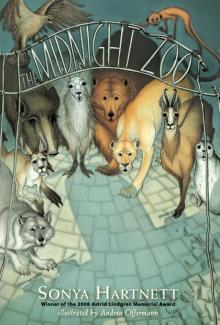 The Midnight Zoo
The Midnight Zoo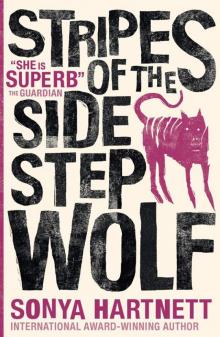 Stripes of the Sidestep Wolf
Stripes of the Sidestep Wolf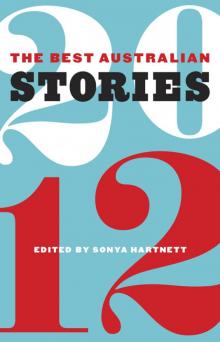 The Best Australian Stories 2012
The Best Australian Stories 2012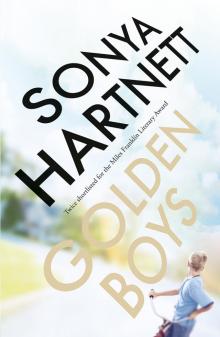 Golden Boys
Golden Boys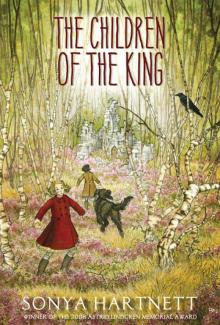 The Children of the King
The Children of the King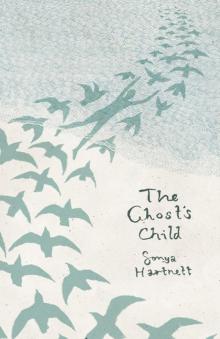 The Ghost's Child
The Ghost's Child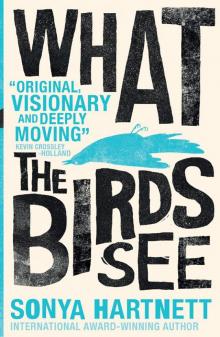 What the Birds See
What the Birds See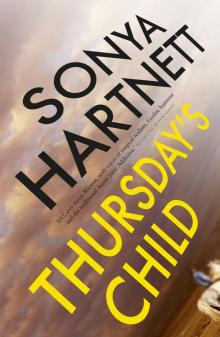 Thursday's Child
Thursday's Child